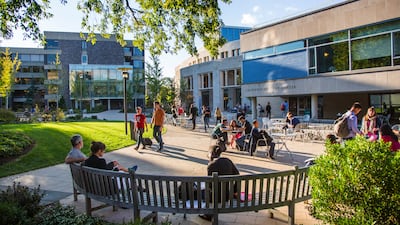What is the point of universities? The question may seem silly. Around 1400 universities are found in 92 countries because most cultures value learning. But universities worldwide are now under all kinds of pressures. Coronavirus has had a significant impact on the student experience.
A friend who was supposed to study at Harvard, for example, was forced to spend a year learning remotely from Europe. In-person lectures and teaching are undoubtedly better than inter-continental Zoom.
British students who wish to study in Europe have discovered Brexit means the Erasmus student exchange programme is now cancelled, although an alternative system called Turing is gearing up.

I strongly support universities because I was the first member of my family to go to university and it changed my life. In those days it was free for British students because taxpayers paid for it. Nowadays, in most countries, students, or their families, either find enormous amounts in university fees or alternatively run up debts, to be paid off over many years once the student begins to earn a salary.
Despite the obvious advantages to every country to have a well-educated and creative workforce – and advantages to students to improve their career prospects – right now we are witnessing in different ways in different countries a global attack on academic freedom. In Britain and elsewhere some universities are being attacked – in that pejorative word – for being "woke".
One of Britain’s great universities, the London School of Economics, last year held a public debate on threats to universities because their researchers noted attacks by governments in many parts of Europe, with some politicians claiming universities embrace unwelcome “ideologies” and supposedly restrict free speech.

The pernicious aspect of this discussion is the idea that it is somehow wrong for many of Britain’s 160 universities to demand from students and academic staff a degree of politeness and understanding towards others in a diverse university community.
I’m chancellor of the University of Kent. It is an honorific, ceremonial position, with no salary, but many great pleasures including the fact that I formally confer degrees on graduates and also offer private and public support to the vice chancellor and those in other executive positions. I also talk to a lot of students.
In recent days some British newspapers, the ones that love to stir up phoney “culture war” controversies, have suggested that opening discussions with students about racial, ethnic, religious and gender identities is somehow “woke”. Yet part of education is to be educated in how to increase tolerance and engage in debate without being insulting or rude.
Some universities have been attacked for work by academics who write new histories of the British empire, based on the experiences of the colonised people, rather than their colonisers. So let me rephrase this debate. Universities are not “woke.” Universities are, or try to be, “enlightened” and “awake.”
That means listening to demands from students and staff to make all our communities aware that robust debate is at the core of a university life, but hate speech is not. Learning how others view the world, and what diverse communities may find offensive, is part of expanding understanding.
Unfortunately not everyone understands what “being understanding” means. A writer in a British newspaper recently complained that in his student days in the 1970s, people did not make a fuss about gender and race issues. He’s right. But in the 1970s people did not have laptops, smartphones, Google and Twitter either. It doesn’t take a university education to note that things have changed in the past 50 years. What it does take is empathy, enlightenment and understanding.
The clue about the value of universities is buried in the Latin roots of the word. Universities are where a universe of knowledge is studied, questioned, celebrated and sometimes overturned. That can be uncomfortable, as Galileo found out in the 1600s when he confirmed that the Sun did not move around the Earth.
Universities are part of wider communities. They connect people, create jobs, help gifted people create knowledge. In the past few days, the University of Kent community has been delighted to learn that one of our own Abdulrazak Gurnah, has been awarded the Nobel Prize for literature.

Professor Gurnah, originally from Zanzibar (now in Tanzania), was a Kent university student and later one of our most distinguished academics. He is Kent university’s second Nobel laureate. Kazuo Ishiguro, a British writer, born in Japan, is also a former student, and also a winner of the Nobel Prize for literature.
Their names, their successes, and their very diverse backgrounds symbolise how universities bring people and ideas together. But right now universities need to stand up and, if necessary, shout from the rooftops, that all around the world – especially in Afghanistan, but also in Poland, Hungary, the US and yes, in Britain – there are those who dislike the uncomfortable questions that universities ask about society, history, empire, gender and other matters. I suspect it is not the asking of questions that our critics dislike. I suspect it may be the sometimes uncomfortable answers.


